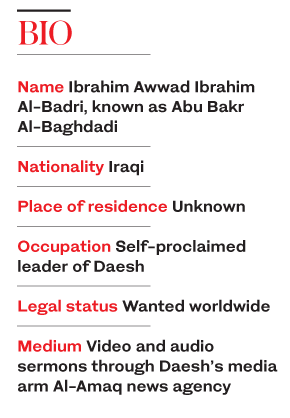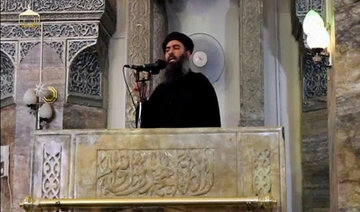BAGHDAD: Sitting cross-legged, the overweight man with a gray-streaked beard spoke slowly and softly. Clad in quasi-military clothes, an AK-47 assault rifle by his side, he could have passed for just another aging Daesh militant, spouting the hatred that has brought parts of the Middle East to its knees over the past five years.
But this was no ordinary paramilitary. The man in the video was the one who started it all: Ibrahim Awwad Ibrahim Al-Badri, who calls himself Abu Bakr Al-Baghdadi, self-proclaimed leader of the Daesh “caliphate” and the most wanted man on earth.
Since he first made that declaration at Mosul’s central mosque July 4, 2014, Al-Baghdadi has been occasionally heard but never seen. Some thought him dead, or at least wounded, and certainly in hiding. To understand why he would suddenly reappear in 18 minutes of propaganda video after five years of invisibility, it is necessary to go back to the beginning.
Al-Baghdadi was born in July 1971 in the Iraqi city of Samarra on the east bank of the Tigris, 125 km north of Baghdad. He had relatives who worked in Saddam Hussein’s feared intelligence service and army, which he was unable to join because of his nearsightedness.
An average student, he enrolled at the Saddam University for Islamic Studies. In the mid-1990s he joined the Muslim Brotherhood. Contemporaries say he left the organization around the turn of the century to mix with determined militants — a path many have followed since.
Al-Baghdadi gained a master’s in Islamic studies and a PhD in Islamic laws in 2000. He loved football, and lived in a small room adjacent to the mosque.
His exact involvement in the insurgency and civil war that gripped Iraq after the US invasion is disputed. He was arrested in Fallujah and held at the infamous Camp Bucca detention camp from early 2004. The ideology that fired Daesh dates back centuries, but its operational origins can be traced to this prison in the mid-2000s. It mixed militants with former Saddam military intelligence officers who together plotted the group’s eventual rise. Al-Baghdadi entered the prison as a mid-level militant and left with enhanced connections and a reputation for religious knowledge.

In 2002, an organization called Tawhid wal-Jihad began to operate in northern Iraq, led by a Jordanian, Abu Musab Al-Zarqawi. Following the 2003 invasion, Al-Zarqawi’s group grew and became part of Al-Qaeda in 2004, under the banner Al-Qaeda in Iraq. Among its recruits was Al-Baghdadi. He rose through the ranks as the US surge started in 2007 and successive leaders were killed. Judged as having sufficient religious authority, he was made leader in 2010.
In 2011, Al-Baghdadi created Jabhat Al-Nusra and said it would join the expanded Islamic State of Iraq and Al-Sham (Daesh). The name is important — “Al-Sham”/Greater Syria evoked memories of previous caliphates. After a dispute, the Al-Qaeda leadership disowned Daesh.
Under Al-Baghdadi’s leadership Daesh rapidly gained and held ground. Raqqa and Fallujah fell in early 2014, followed by Mosul. Daesh was no longer a terrorist group, but an army with occupied territory.
On July 4, 2014, after the world had been shocked by the group’s lightning military advances, Al-Baghdadi seized his moment with the address at Mosul’s central mosque in which he deliberately highlighted mannerisms and stylistic elements to evoke the style of previous caliphs.
Before he spoke he used a miswak to clean his teeth in the traditional way. He wore a black turban, and spoke classical Qur’anic Arabic, claiming to be implementing God’s law.
As the so-called “caliphate” established itself, Al-Baghdadi was a looming, if not visible, figure. Audio recordings were released intermittently. In the spring of 2015, he laid bare his twisted religious views, saying Islam was never a peaceful religion but was “the religion of fighting.”
In September 2017, Al-Baghdadi reiterated his call for global jihad, calling for “soldiers of Islam in every location to increase blow after blow.”
Opinion
This section contains relevant reference points, placed in (Opinion field)
Nevertheless, by February 2019, Daesh had been reduced to a bleak encampment in Baghouz, Syria, where the last remaining fighters were killed or taken prisoner. Even before that, Iraqi security officials told Arab News, many Daesh fighters and commanders “had become skeptical of Al-Baghdadi, and accused him of being lazy.”
However, tanks and bombs had failed to kill Al-Baghdadi himself, or his group’s ideas. His new propaganda video was a wake-up call to the world’s intelligence community, but it was addressed mainly to his remaining followers.
“Al-Baghdadi was forced to appear at this time to respond to the charges against him by other leaders of his organization, especially that he abandoned his fighters,” an Iraqi national security official and psychological analyst told Arab News.
Another intelligence officer said: “There are real problems suffered by the organization, especially after losing Baghouz. Al-Baghdadi was trying to defend himself, and justify the loss of his fighters in Mosul and Sirte.
“He was denying the charges of cowardice and abandoning his fighters, and sought to give them new hope. These are psychological messages to raise their morale.
“The video clearly indicates the breakdown of confidence between Al-Baghdadi and his leaders.”
For those monitoring Daesh’s violence, it was a reminder that although the group may no longer hold territory, it is still a global threat, led by an ideologue who uses false religious justification to support its crimes.























